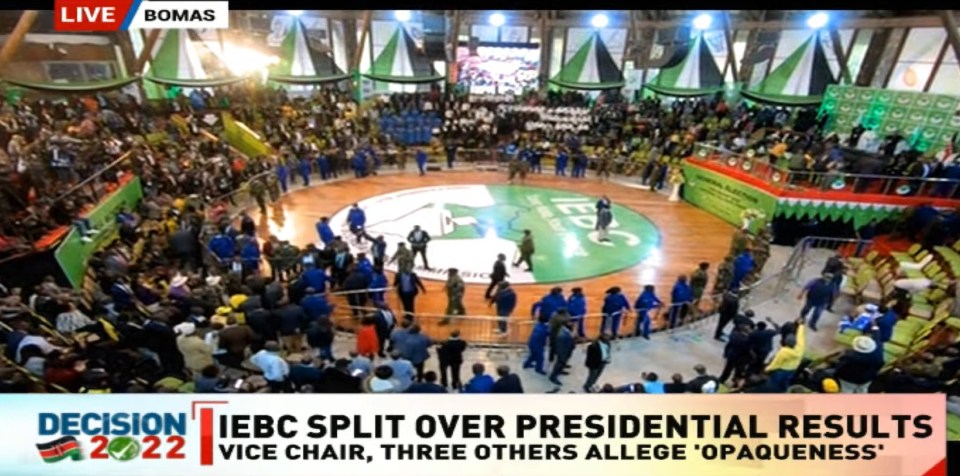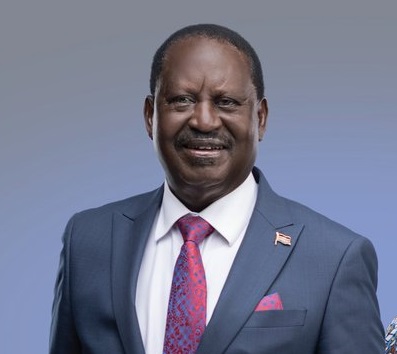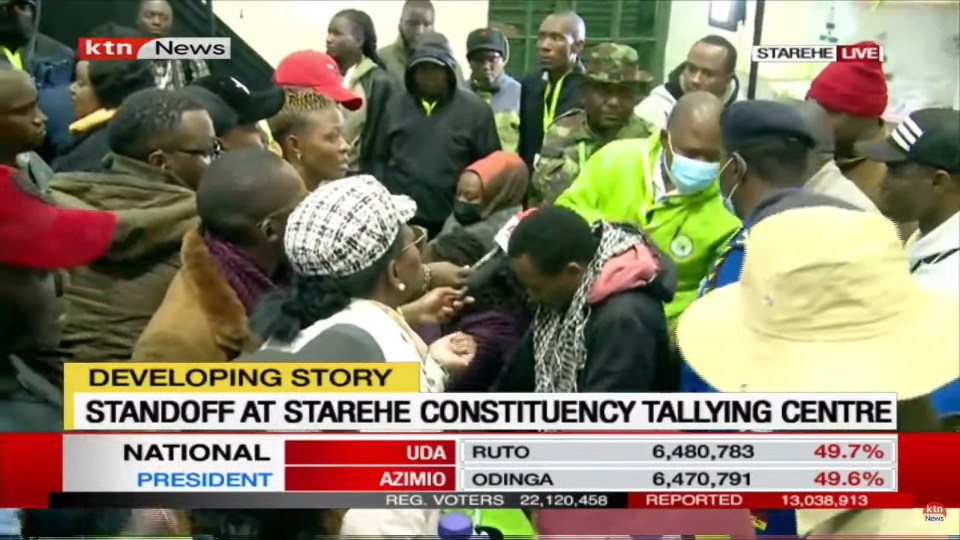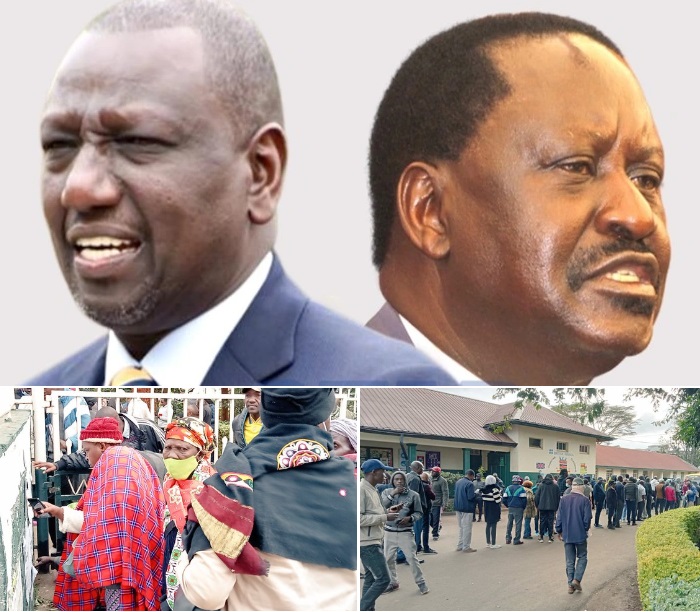BREAKING – Political earthquake becomes reality in Kenya: ‘Hustler’ William Ruto BEATS Raila Odinga and takes presidency amid fighting and chaos

Kenya’s electoral committee has just said William Ruto has won the country’s 2022 presidential election, which took place last Tuesday.
The announcement comes minutes after fighting broke out at Bomas of Kenya, where the election results were announced.
Despite four electoral committee members walking out and ‘disowning’ the result, the IEBC went ahead and said establishment candidate Odinga lost from Ruto after nearly a week of vote counting.
In dramatic scenes in Nairobi, with security personnel dragging out multiple people amid screams and cries, it is now becoming increasingly likely Ruto will replace outgoing President Jomo Kenyatta, leaving government after a decade at the helm.

However, the result does not mean the political vacuum is filled: East Africa is holding its breath as millions wait to see how Odinga and the country’s establishment will take the news and whether he and his followers are prepared to admit defeat.
Historically, candidates fight on even after formal results have been announced, with riots, court proceedings and fraud allegations usually flying high.

Both Odinga and Ruto polled for days at 50 per cent of the vote most of last week, but the IBC confirmed today Ruto took a slight lead and ultimately wins the 2022 presidential election.
By law, results had to be announced within one week after the election, so before midnight tomorrow.
To win outright, a candidate needed more than half of all votes and at least 25 per cent of the votes in more than half of Kenya’s 47 counties.
Scuffles and fraud allegations
Since last week an extremely close race had unfolded between the two main candidates for the presidency, with millions of Kenyans holding their breath as they wait what today would bring.
Opposition leader Raila Odinga, who is backed by the outgoing president and seen as the establishment candidate, faced deputy president William Ruto, who styles himself as an outsider and a “hustler”.
In the runup to today’s announcement, several standoffs and scuffles broke out across the country this week, primarily at polling stations and mostly disputes over vote counting and submitted or incomplete ballot papers.
Also, allegations and statements of elections fraud are flying high with several prominent politicians taking to social media to make wild, unverified claims.

More than 22m registered voters had the chance to endorse their favourite candidates in 46,232 polling stations across the country last week.
However, fewer Kenyans voted. Turnout was just under 60 per cent as polls closed with some voters citing little hope of real change.

Eerily quiet
Since Tuesday’s elections many Kenyan streets were, and still are, deserted, as millions of people nervously waited at home for the result and whether parties will accept the formal outcome.
Apart from chaotic scenes at polling stations, most streets are eerily quiet, and there is less traffic than normal.
Public transport is also at a minimum and in capital Nairobi a large police presence can be spotted on the street.
Regional powerhouse
Tuesday’s election was considered close but calm.
This is partly because economic issues such as widespread corruption and rising cost of living were of greater importance than the ethnic tensions that have marked past votes with sometimes deadly results.
Kenya is a standout with its relatively democratic system in a region where some leaders are notorious for clinging to power for decades.
Its stability is crucial for foreign investors, the most humble of street vendors and troubled neighbours like Ethiopia and Somalia.
2007 election violence
Elections can be exceptionally troubled, as in 2007 when the country exploded after Mr Odinga claimed the vote had been stolen from him and more than 1,000 people were killed.
Mr Ruto was indicted by the International Criminal Court for crimes against humanity for his role in the violence, but his case was terminated amid allegations of witness tampering.
In 2017, the high court overturned the election results, a first in Africa, after Mr Odinga challenged them over irregularities.
He boycotted the new vote and proclaimed himself the “people’s president”, bringing allegations of treason. A public handshake between him and Mr Kenyatta calmed the crisis.
This is likely Odinga’s last try. Mr Ruto and Mr Odinga have said they will accept the official results — if the vote is free and fair.
“It is every Kenyan’s hope,” the president told journalists on Tuesday.

Rising food prices
Rising food and fuel prices, debt at 67 per cent of GDP, youth unemployment at 40 per cent and corruption put economic issues at the centre of an election in which unregulated campaign spending highlighted the country’s inequality.
“We need mature people to lead, not someone who abuses people. Someone who respects elders,” said 55-year-old teacher Rosemary Mulima.
She still has “very high” hopes for Mr Odinga on his fifth try.

The top candidates were Raila Odinga, a democracy campaigner who has vied for the presidency for a quarter-century, and 55-year-old Deputy President William Ruto, who had stressed his journey from a humble childhood to appeal to struggling Kenyans long accustomed to political dynasties.
“In moments like this is when the mighty and the powerful come to the realisation that it is the simple and the ordinary that eventually make the choice,” Mr Ruto told journalists last week.
“I look forward to our victorious day.”
Raila Odinga last week
“I have confidence that the people of Kenya are going to speak loudly in favour of democratic change,” Mr Odinga told journalists on the election day, last Tuesday. A cheering crowd jogged alongside his convoy as he arrived to vote in Nairobi.
To win outright, a candidate needed more than half of all votes and at least 25 per cent of the votes in more than half of Kenya’s 47 counties.
Results had be announced within a week, but impatience is expected if they do not come before this weekend.
“What we want to try to avoid is a long period of anxiety, of suspense,” said Bruce Golding last week, who led the Commonwealth election observer group.
End of Kenyatta era
Outgoing President Uhuru Kenyatta, the son of Kenya’s first president, cut across the usual ethnic lines and angered Ruto by backing long-time rival Mr Odinga after their bitter 2017 election contest.
But both Mr Odinga and Mr Ruto picked running mates from the country’s largest ethnic group, the Kikuyu.
Mr Odinga, 77, made history by choosing running mate Martha Karua, a former justice minister and the first woman to be a leading contender for the deputy presidency.
The Independent Electoral and Boundaries Commission estimated that final turnout would be above 60 per cent, far lower than the 80 per cent in the 2017 election. That would make it Kenya’s lowest turnout in 15 or even 20 years.
The electoral commission signed up less than half of the new voters it had hoped for, just 2.5m
“The problems from (the previous election), the economy, the day-to-day life, are still here,” said 38-year-old shopkeeper Adrian Kibera.
“We don’t have good choices,” he sighed, calling Mr Odinga too old and Mr Ruto too inexperienced.
The post BREAKING – Political earthquake becomes reality in Kenya: ‘Hustler’ William Ruto BEATS Raila Odinga and takes presidency amid fighting and chaos appeared first on CityAM.
For all the latest Lifestyle News Click Here
For the latest news and updates, follow us on Google News.

